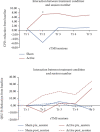Repetitive Transcranial Magnetic Stimulation for Tobacco Treatment in Cancer Patients: A Preliminary Report of a One-Week Treatment
- PMID: 35909440
- PMCID: PMC9293555
- DOI: 10.1155/2022/2617146
Repetitive Transcranial Magnetic Stimulation for Tobacco Treatment in Cancer Patients: A Preliminary Report of a One-Week Treatment
Abstract
Background: Smoking cessation represents a significant opportunity to improve cancer survival rates, reduces the risk of cancer treatment complications, and improves quality of life. However, about half of cancer patients who smoke continue to smoke despite the availability of several treatments. Previous studies demonstrate that repetitive transcranial magnetic stimulation (rTMS) over the left dorsolateral prefrontal cortex (DLPFC) decreases cue craving, reduces cigarette consumption, and increases the quit rate in tobacco use disorder. We investigated whether 5 sessions of rTMS can be safely and efficaciously used for smoking cessation in cancer patients.
Methods: We enrolled 11 treatment-seeking smokers with cancer (>5 cigarettes per day) in a randomized, double-blind, sham-controlled proof-of-concept study. Participants received 5 daily sessions of active 10 Hz rTMS of the left DLPFC (3000 pulses per session) or sham rTMS and were followed up for 1 month via phone assessments. Main outcomes included reductions in the number of smoked-cigarettes per day (primary) and craving (secondary). Adverse effects were reported daily by participants.
Results: Seven of 11 participants completed 5 sessions of rTMS over one week. Compared to sham treatment (n = 4), the active rTMS (n = 3) exhibited modest effects overtime on smoking (Cohen's f 2 effect size of 0.16) and large effects on cue craving (Cohen's f 2 = 0.40). No serious side effects related to rTMS were reported in the treatment.
Conclusions: Five sessions of daily rTMS over the left DLPFC might benefit cancer patients who smoke cigarettes. However, further evidence is needed to determine with more certainty its therapeutic effect and adverse effects for cancer patients who smoke cigarettes.
Copyright © 2022 Xingbao Li et al.
Conflict of interest statement
The other authors declare no conflicts of interest.
Figures

Similar articles
-
Two weeks of image-guided left dorsolateral prefrontal cortex repetitive transcranial magnetic stimulation improves smoking cessation: A double-blind, sham-controlled, randomized clinical trial.Brain Stimul. 2020 Sep-Oct;13(5):1271-1279. doi: 10.1016/j.brs.2020.06.007. Epub 2020 Jun 10. Brain Stimul. 2020. PMID: 32534252 Free PMC article. Clinical Trial.
-
Repetitive transcranial magnetic stimulation of the dorsolateral prefrontal cortex reduces nicotine cue craving.Biol Psychiatry. 2013 Apr 15;73(8):714-20. doi: 10.1016/j.biopsych.2013.01.003. Epub 2013 Feb 26. Biol Psychiatry. 2013. PMID: 23485014 Free PMC article. Clinical Trial.
-
Transcranial magnetic stimulation of the dorsal lateral prefrontal cortex inhibits medial orbitofrontal activity in smokers.Am J Addict. 2017 Dec;26(8):788-794. doi: 10.1111/ajad.12621. Epub 2017 Sep 12. Am J Addict. 2017. PMID: 28898485 Free PMC article.
-
Effects of repetitive transcranial magnetic stimulation (rTMS) on craving and substance consumption in patients with substance dependence: a systematic review and meta-analysis.Addiction. 2019 Dec;114(12):2137-2149. doi: 10.1111/add.14753. Epub 2019 Aug 16. Addiction. 2019. PMID: 31328353
-
Effects of repetitive transcranial magnetic stimulation on nicotine consumption and craving: A systematic review.Psychiatry Res. 2019 Nov;281:112562. doi: 10.1016/j.psychres.2019.112562. Epub 2019 Sep 9. Psychiatry Res. 2019. PMID: 31521838
Cited by
-
Cellular and Molecular Effects of Magnetic Fields.Int J Mol Sci. 2024 Aug 17;25(16):8973. doi: 10.3390/ijms25168973. Int J Mol Sci. 2024. PMID: 39201657 Free PMC article. Review.
-
Symptom Provocation and Clinical Response to Transcranial Magnetic Stimulation: A Systematic Review and Meta-Analysis.JAMA Psychiatry. 2025 Aug 1;82(8):768-777. doi: 10.1001/jamapsychiatry.2025.0792. JAMA Psychiatry. 2025. PMID: 40465306 Free PMC article.
-
Brain stimulation therapeutics.Addict Neurosci. 2023 Jun;6:100080. doi: 10.1016/j.addicn.2023.100080. Epub 2023 Mar 5. Addict Neurosci. 2023. PMID: 38770029 Free PMC article.
References
LinkOut - more resources
Full Text Sources
Medical
